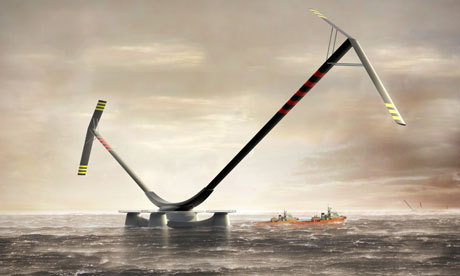Climate Technology
All Stories
-
Solar panels to match your couch
Excited about your inevitable solar panels, but concerned they'll clash with your decor? Qsolar has you covered, you fashion victim. Their colored solar panels aren't just for the roof — they can be integrated into the design of a building as cool-looking and functional walls or (semi-transparent) windows.
-
The race to build the world’s most improbably gigantic — and efficient — wind turbine
Modern wind turbines already have blades as big as the wings of jumbo jets, and the tips of them can move at up to 200 mph. Now Britain's Energy Technologies Institute wants to nearly double the generating capacity of the world's largest wind turbines by making the blades EVEN MORE PHENOMENALLY HUGE. Bigger turbines mean […]
-
Why you’ll soon have solar panels, in three easy graphs
The cost of silicon solar panels has been falling precipitously, with no end in sight. Naturally, falling costs mean solar installation has been exploding worldwide. By the time new coal-fired power plants come on-line in the U.S., solar will already be cheaper. If you want to understand what kind of revolution this will bring about […]
-
South Korea will create 1.5 million green energy jobs
Going green costs jobs? Tell that to South Korea. The country plans to create 1.5 million jobs — and, not for nothing, 328 trillion won ($304 billion) in new exports — by increasing investment in green energy. Oh, also, South Korea predicts that this new commitment to renewables — which will include solar, wind, fuel […]
-
What Dow Chemical doesn’t want you to know about your water
Dow’s plant in Midland, Mich., is polluting the water with dioxin.Photo: erika dot netThis post originally appeared on Civil Eats. Earlier this year, I was contacted by a PR firm working for Dow Chemical to contribute a 60-second video for the Future We Create virtual conference on water sustainability the company launched yesterday. As a […]
-
No joke: This is the biggest battery breakthrough ever
A pioneer in battery research who already successfully launched a $350 million company to supply batteries to the likes of GE and Chrysler has done it again — only this time, "it" represents the complete reinvention of battery technology as we know it. This technology is in the research phase, but if it can be […]
-
GM’s CEO says a gas tax hike would help the auto industry
General Motors CEO Dan Akerson doesn't want tougher fuel efficiency standards. That's no surprise. Here's the surprise: What he wants instead is a $1-per-gallon gas tax increase. If given a choice between a gas surcharge and the increasing fuel efficiency standards that are set to phase in over the next 15 years or so, Akerson […]
-
Double standard for fuel efficiency is literally killing Americans
An economist at UC San Diego has made a startling finding: The peculiarly American system of having one fuel efficiency standard for cars and a different, less stringent one for SUVs and trucks is increasing highway fatalities. The problem is that under the existing, two-tiered system, increases in fuel efficiency standards force car makers to […]
-
Why buy an electric car? National security, says Iraq vet
Tim Goodrich has served three tours of duty in a support role in Iraq and Afghanistan, and he loves his all-electric Nissan Leaf. His basic message, for all the Vince Vaughan types out there, is that if Americans think electric cars are “gay,” maybe it's because we aren’t as in touch with what it takes […]
-
Contaminated compost? Toxins might be lurking in that bag you’re about to buy
Do you know what’s in your compost?The growing number of municipal and commercial composting operations has been one of the few bright spots in the environmental landscape, from San Francisco’s curbside composting service to this industrial-scale composting facility in Delaware. But Josh Harkinson in Mother Jones has harshed our green-tinged buzz. Thanks to fractured or […]







